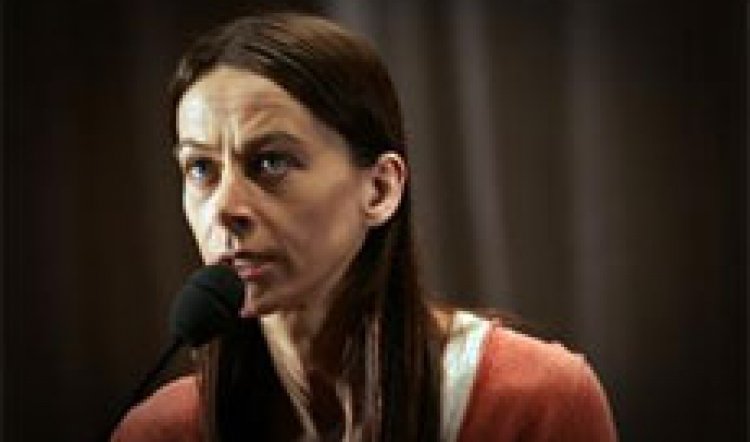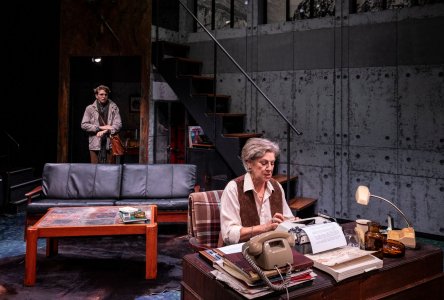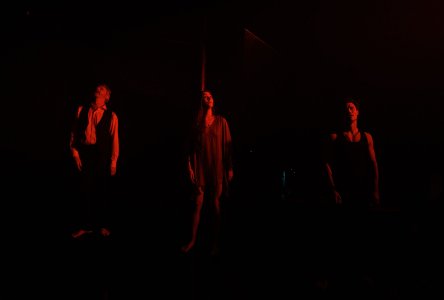
Sydney Festival 08 - Aalst
Aalst, Carriageworks, Wilson St; 18-23 January 2008, (then Brisbane and elsewhere overseas)
The first visit to Australia by the three-year-old National Theatre of Scotland, for the 2008 Sydney Festival, has been a critical and popular triumph. First with Black Watch (see review) then with Aalst.
With both productions the NTS set out to take no prisoners and achieved their goal in very different ways. Where Black Watch is a kaleidoscopic swirl of ensemble playing throughout the length of Carriageworks’ Bay 17, Aalst (Bay 19) is a tightly-focused two-hander (plus the disembodied interlocutory “Voice” of Gary Lewis) where the absence of physical movement is as stirring and disconcerting as the non-stop choreography of Black Watch.
Aalst is based on a particularly horrible true crime committed in the Belgian town of the title in 1999. First conceived, directed and designed by Pol Heyvaert of Ghent’s Victoria theatre company, the play is fictionalised to some degree but drawn from court transcripts, TV footage and a documentary as well as police interviews (and was threatened in 2005 by a suit brought by lawyers acting for one of the convicted murderers). It has since been reworked in English by Duncan McLean, in close collaboration with Heyvaert, for NTS and two brilliant actors, Kate Dickie and David McKay.
Dickie and McKay play a nondescript couple, Cathy and Michael Delaney. In answer to the initially dispassionate questioning of the unseen interrogator, they gradually tell of their stay in a hotel room in Aalst. There they suffocated their three-month-old daughter, wrapped her body in a blanket and told their seven-year-old son that she was sleeping. Three days later, after one botched attempt, they collaborated in stabbing the boy to death with a pair of scissors.
The Voice leads first Cathy then Michael back from this sojourn - repeatedly described by Cathy in a flat, puzzled voice as “horrific” - to meandering accounts of their own lives, as children and adults. None of it is pretty. Both endured loveless, joyless childhoods where abandonment and abuse were the norm. Cathy had an incestuous relationship with her father and now has a sexually and physically violent relationship with Michael.
Michael takes care to ensure that anyone listening understands that, on an occasion under review, he did not punch Cathy - as he could have - but only slapped her; because he knew it was wrong to punch women. This same irrefutable logic permeates the thinking of the pair on all levels. Indignant that a pestering next-door neighbour had complained about the noise of their music and their five TV sets (one being thrown out of a window and disturbing her).
In a rare show of emotion Michael bursts out, with furious reasoning, that She should have got herself five TVs then she could have afforded to throw one out the window too. And anyway, how did she expect anyone to throw a TV out the window quietly? Hmmm?

The same crazy reasonableness is the chilling centre of the murder of their two small children. “Don’t tell me we didn’t want what’s best for our kids,” Michael says, angrily. And by that - and without further explanation - it is suddenly clear that somewhere in the poor labyrinth of his mind he did not believe the lives they were living were good enough for the children. Without being able to articulate it, or indeed, without really meaning it perhaps, the pair were calling a halt to generations of abuse. It could go no further, no more children could be made frightened, hurt and unhappy as he and Cathy had been.
Like so many moments in Aalst, this realisation is stunning and the more so for being both awful and understandable. These are not monsters; according to psychiatric reports they were not insane and they certainly don’t seem insane. It is too easy to haul in descriptions such as “evil” and even easier to respond with the “tsk tsk, society failed them” absolution line. Nothing about Aalst is easy, obvious and nor is it overtly awful. The pair barely move and do not leave their chairs. Any violence or horror are in the ears and minds of beholders. That some beholders choose to walk out - a lot more in the UK than in Sydney, apparently - is as worthy of examination as the motives, lives and thinking of the Delaneys.
What is remarkable about the play is that in telling the story of two hopeless parasites on society who, between them, commit one of the least forgivable crimes our society can contemplate, Aalst does not judge them in these terms at all. And at the same time, because of the dispassionate, unemotional and unsensational way the revelations unfold, it causes a sudden and (in my case anyway) permanent halt in the usual rush to judgement.
This is not to say that Aalst in any way lets the Delaneys off the hook; rather, it says to those who watch and listen: let he or she who is without sin cast the first stone. Judgement becomes impossible and pity takes over. Pity rather than “feeling sorry” for them. Heyvaert and McLean are too smart to try to inject likeability into the characters. They are as they are and they defy easy categorisation and easy condemnation.
Both actors are tremendous. The play runs for an excruciatingly intense 70 minutes and by the end there is not a nerve untwanged nor a heart or mind untouched. Aalst is the most extraordinary work of theatre among many at this Festival.



